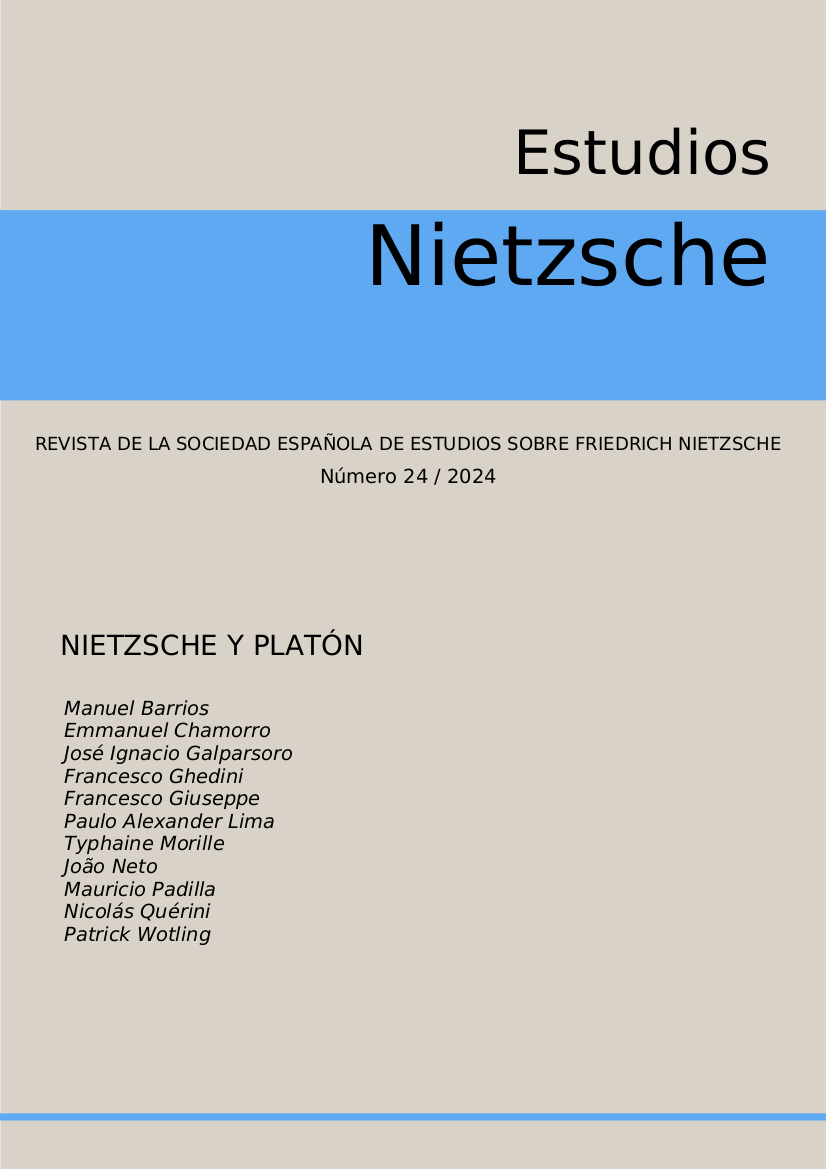Plato in Basel
Dimensions of the interpretation of Platonism in Nietzsche and Foucault
DOI:
https://doi.org/10.24310/en.24.2024.17803Keywords:
Nietzsche, Plato, Foucault, Parrhesia, Care of the SelfAbstract
In recent years, we have witnessed a growing interest in the cross-reading of the work of Nietzsche and Foucault around the common topics of the aesthetics of existence, parrhesia and self-care, which are structured through their respective approaches to the Greco-Roman world. This new connection between the two authors allows the development of certain intuitions that define their genealogical analyses of our culture, but which had not captured the attention of specialists. In this paper, we do not try to provide an exhaustive description of all these controversial issues, but to clarify them by examining a specific aspect related to this type of approach to the work of Nietzsche and Foucault: the treatment that both authors offer of the figure of Plato in relation to questions such as the philosophical life, the will to truth, or the ethics of self-care. Thus, revisiting the lessons given by the young Nietzsche in Basel and the courses and writings of the late Foucault allows us to make his reconstruction of Platonism more complex, going beyond the cliché that identifies Plato as the founder of metaphysics.
Downloads
Metrics
References
Abbey, R., Nietzsche’s Middle Period, Oxford: Oxford University Press, 2000.
Álvarez Yágüez, J., «Introducción», en M. Foucault, La parrêsía, edición y traducción de Jorge Álvarez Yágüez, Madrid: Biblioteca Nueva, 2017, pp. 25-92.
Andler, Ch., Nietzsche, sa vie et sa pensée, Paris: Gallimard, 1958.
Ansell-Pearson, K. Nietzsche’s Search for Philosophy on the Middle Writings, New York: Bloomsbury, 2018.
Atack, C. «Plato, Foucault and the conceptualization of parrhesia», en History of Political Thought, nº 40, 2019, pp. 23-48.
Barrios casares, M., La voluntad de poder como amor, Madrid: Arena Libros, 2007.
Barrios casares, M., Tentativas sobre Nietzsche, Madrid: Abada, 2019.
Barrios Casares, M., «Prefacio» a Ecce Homo, en F. Nietzsche, Obras completas volumen IV: escritos de madurez II y complementos a la edición (=OC IV), edición dirigida por Diego Sánchez Meca, Madrid: Tecnos, 2016, pp. 775-780.
Bouveresse, J., Nietzsche contra Foucault: sobre la verdad, el conocimiento y el poder, Madrid: Ediciones del Subsuelo, 2020.
Chamorro, E., «Disciplina y capitalismo en la genealogía foucaultiana de la modernidad (1973-1975)», en Revista de Estudios Sociales, 75, 2021, pp. 2-14.
Foucault, M., Nietzsche, la genealogía, la historia, traducción de José Vázquez Pérez, Valencia: Pre-Textos, 1988.
Foucault, M., «Philosophie et psycologie», en M. Foucault, Dits et écrits I: 1954-1969, édition établie sous la direction de Daniel Defert et François Ewald avec la collaboration de Jacques Lagrange, Paris: Gallimard, 1994, pp. 438-448.
Foucault, M., El gobierno de sí y de los otros: curso en el Collège de France (1982-1983), edición establecida por Frédéric Gros, bajo la dirección de François Ewald y Alessandro Fontana, Madrid: Akal, 2011.
Foucault, M., «Estructuralismo y postestructuralismo», en M. Foucault, Obras esenciales, trad. Miguel Morey, Fernando Álvarez Uría, Julia Varela y Ángel Gabilondo, Barcelona: Paidós, 2014, pp. 951-974.
Foucault, M., El coraje de la verdad, el gobierno de sí y de los otros, II: curso en el Collège de France (1983-1984), edición establecida por Frédéric Gros, bajo la dirección de François Ewald y Alessandro Fontana, Madrid: Akal, 2014.
Foucault, M., Historia de la sexualidad 2: el uso de los placeres, Madrid: Siglo XXI, 2019.
Foucault, M., La hermenéutica del sujeto: curso en el Collège de France (1982), edición establecida por Frédéric Gros, bajo la dirección de François Ewald y Alessandro Fontana, Madrid: Akal, 2021.
Foucault, M., Discurso y verdad: conferencias sobre el coraje de decirlo todo Grenoble, 1982 / Brekeley, 1983, edición y aparato crítico de Henri-Paul Fruchaud y Daniele Lorenzini, introducción de Frédéric Gros, edición en español al cuidado de Edgardo Castro, Buenos Aires: Siglo XXI, 2022.
Han, B., Foucault’s Critical Project: Between the Transcendental and the Historical, California: Stanford University Press, 2002.
Hoyos, I., «Estéticas y políticas de la existencia en la literatura antigua: las lecturas de Foucault y Nietzsche», en Badebec, vol. 7, nº 13, 2017, pp. 260-278.
Larrauri, M., «La vida eterna», en Er, revista de filosofía, nº 16, 1994, pp. 73-84.
Niemeyer, Ch. (ed.), Diccionario Nietzsche: conceptos, obras, influencias y lugares, edición española de Germán Cano, Madrid: Biblioteca Nueva, 2012.
Nietzsche, F., Fragmentos póstumos (=FP), 4 vol., Madrid: Tecnos, 2006-2010.
Nietzsche, F., Obras completas, (=OC), 4 vol., Madrid: Tecnos, 2011-2016.
Nietzsche, F., Introducción al estudio de los Diálogos de Platón (= IDP), edición, traducción y notas de Manuel Barrios Casares, Madrid: Tecnos, 2019 (recogida también en OC II, 2013).
Platón, El político, en Platón, Diálogos V, Madrid: Gredos, 1988, pp. 483-617.
Sánchez Madrid, N., «La parresía como eje de la gubernamentalidad antigua: El gobierno de sí y de los otros (1982-1982)», en J. L. Moreno Pestaña (ed.), Ir a clase con Foucault, Madrid: Siglo XXI, 2021, pp. 289-309.
Sánchez Meca, D., Nietzsche: la experiencia dionisíaca del mundo, Madrid: Tecnos, 2005.
Downloads
Published
How to Cite
Issue
Section
License
Copyright (c) 2023 Manuel Barrios, Emmanuel Chamorro

This work is licensed under a Creative Commons Attribution-NonCommercial-ShareAlike 4.0 International License.
As of issue 21 (2021) this journal is published only in open access (diamond route).
From that number 21, like the previous numbers published in NIETZSCHE STUDIES, they are subject to the Creative Commons Acknowledgment-NoComercia-ShareIgual 4.0 license, the full text of which can be consulted at <http://creativecommons.org/licenses/by-nc-sa/4.0 >
It is the responsibility of the authors to obtain the necessary permissions of the images that are subject to copyright.
This work is licensed under a Creative Commons Attribution-NonCommercial-ShareAlike 4.0 International License.
Copyright generates two different rights: moral rights and patrimonial rights that EJFB recognizes and respects. Moral rights are those relating to the recognition of the authorship. They are rights of a personal nature that are perpetual, inalienable, unseizable and imprescriptible as consequence of the indivisible union of the author and his/her work.
Patrimonial rights are those that can be derived from the reproduction, distribution, adaptation or communication of the work, among others.







11.png)
